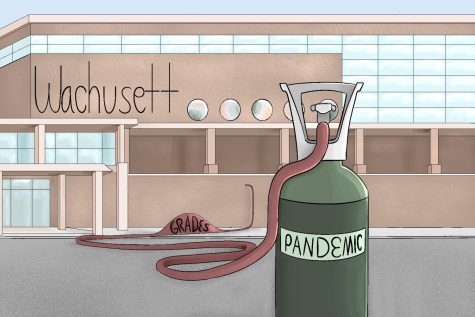Tardy Policy Negatively Affects Students
All high schoolers know the dread of 7:35 am approaching, as the car meanders through the center of Holden. Whether due to a missed bus, stubborn parents, or faulty alarm, being in danger of being tardy to school can be one of the worst feelings.
Every student has three excused tardies per quarter, but that may not meet every student’s needs. Although this policy sounds like it would work quite well, some students have complaints. The Regional’s tardy policy negatively affects kids, and causes them to miss even more school.
“I think it is unfair especially because sometimes teachers will send students to the office even if they are in the doorway when the bell rings, which is just stupid,” said senior Emma Finnerty.
Some argue that kids must prepare for the real world, where being late is unnaceptable. But high school is not the real world. Every student operates under different circumstances, and unexpected occurrences may happen out of a student’s control. Is it fair to punish a student for something they may not have been able to prevent?
Many underclassmen without the ability to drive have no other choice than to either take the bus or be driven by a parent. In many cases, underclassmen students prepare to leave for school at an appropriate time, but their parent does not. This scenario can frustrate both students and parents, leading to stress and anger.
“I think it [the tardy policy] is unnecessary and stressful. There could be so many better and effective ways to enforce a late policy,” said sophomore Ekaavli Daga.
Upperclassmen can also be negatively affected by the tardy policy. Some students take advantage of this rule, if they have exhausted their three “free” tardies, they may decide that, in lieu of a detention, they will just take a day off of school. However, after 8 absences, they run the risk of losing class credit.
“I’ve already been late three times this quarter. If it happens again, I’ll turn my car around. I don’t want a D-Hall,” said junior Anesu Munochiveyi.
Certain schools implement a policy in which tardies are examined on a case to case basis and reviewed to assess whether it was legitimate or not. Punishing students who are tardy for valid reasons is not only frustrating for students, but also for parents. A transparent policy where administration is more lenient and understanding may create a better relationship with students showing up on time.
Students agree that they should be held accountable for their tardiness, but there has to be a better system put in place, especially in extenuating circumstances.
“I think there should be a two minute grace period on tardiness for first period as kids get into school at all different times, and most students want to be on time for class,” said freshman Sydney Marshall. “That feels more fair than an immediate detention.”
Other students agree that it doesn’t seem like a fair system.
“If I slept in late because I was up completing homework or working or there were circumstances beyond my control or if my parent forgot to call in because I had an appointment, I shouldn’t be automatically sentenced to a detention,” Finnerty said.
Despite disagreements with students, administration emphasizes the positive aspects of their attendance policy by highlighting some of the reasons why it is important.
“One of the most important parts is being in class on time. Arriving late disrupts the teacher, along with the flow of the class,” said principal William Beando.
That being said, looking at tardies on a case by case basis and giving exceptions to students who may not be able to control when they get to school could bring real change to a student’s attitude.
“If there wasn’t a strict tardy policy, it would definitely give me a sense of security when coming in late. I feel like I could explain my situation, and they would help me out,” said Finnerty.

Patrick is a junior at Wachusett. He is writing for the Echo while in Ms. Saadi’s journalism class. In his free time, he enjoys working out and skiing.

Paige is a senior who has been with the Echo art department for 4 years. She enjoys baking cupcakes and taking photos of scenery and animals.













